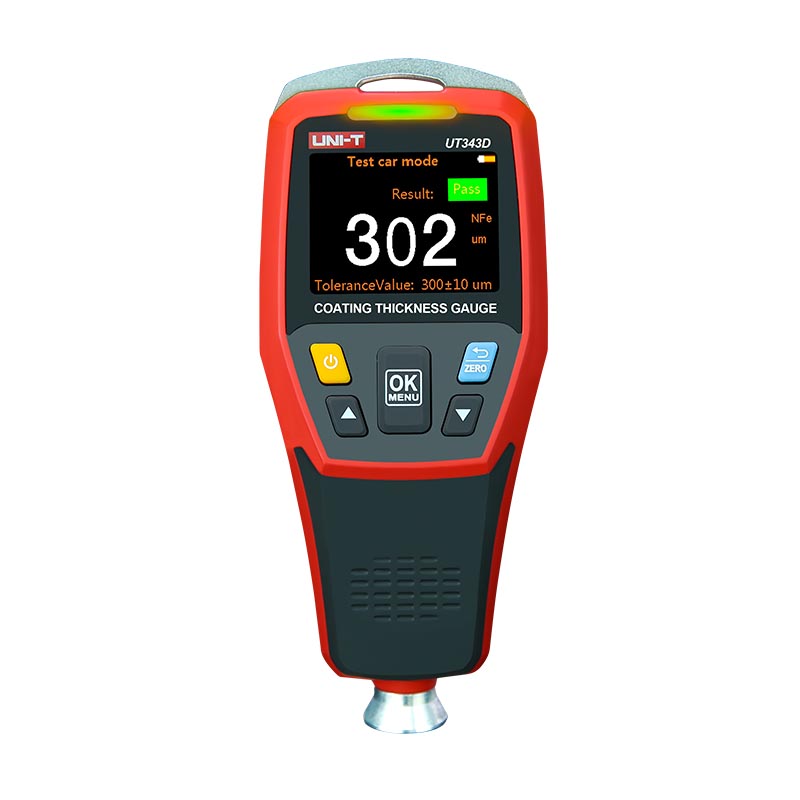Coating Thickness Gauge
Coating thickness gauge
Precision and reliability in coating thickness measurement
Coating thickness gauges are indispensable tools for many industries, whether in the industrial sector, automotive manufacturing, quality control in the construction industry or in the maintenance and inspection of paintwork. These devices make it possible to accurately determine the thickness of different materials and coatings, helping to ensure optimum quality standards.
Modern coating thickness gauges are characterized by high precision and reliability. They can work on a variety of surfaces and substrates, including metal, plastic and wood. This versatility makes them an indispensable tool for a wide range of measuring tasks.
Versatile application possibilities
Coating thickness gauges can be used for a wide range of applications. They are used in the automotive industry to measure the thickness of car paints to ensure a perfect appearance and the best possible corrosion protection. They are also used in the construction industry to check the thickness of protective coatings and ensure the longevity of building structures.
In electrical engineering and electronics, coating thickness gauges can also provide important services, for example when checking the thickness of printed circuit board coatings or when checking the protective coatings on various electrotechnical components. This not only contributes to the functionality, but also to the safety of electrical devices.
Easy to use and handle
The handling of modern coating thickness gauges is generally very user-friendly. Most devices feature large, easy-to-read displays and intuitive menus that make them easy to navigate. Thanks to their compact design and low weight, they can be easily transported and used in different locations. In most cases, they also have an ergonomic design that ensures comfortable handling.
In addition to simple point measurement, many models also offer the option of carrying out continuous measurements or saving and evaluating several measuring points. This makes it much easier to document and analyze the measurement results.
Advanced technologies
Coating thickness gauges are based on a variety of advanced technologies to ensure maximum measurement accuracy. The most common measurement methods include the magnetic induction method and the eddy current method. Both methods offer high measurement accuracy and reliability, with the choice of method depending on the type of material to be measured.
Some modern devices also use ultrasonic technology to determine the coating thickness. This method is particularly effective for non-conductive coatings and enables high measurement accuracy even with complex geometries. In addition, many devices offer the option to transmit data wirelessly, allowing the measured values to be sent directly to computers or mobile devices.
Maintenance and calibration
In order to ensure the high precision and reliability of coating thickness gauges over the long term, regular maintenance and calibration is essential. Manufacturers usually offer corresponding calibration kits with which users can check and recalibrate their devices themselves. In addition, the devices should be taken to a specialist dealer at regular intervals to have a professional calibration carried out.
Care of the coating thickness gauges is also important. The devices should always be kept clean and protected from mechanical damage. For devices with external probes, make sure that they are not contaminated by dust or dirt so as not to impair the measuring accuracy.
Choosing the right coating thickness gauge
With so many models available, it is important to choose the right coating thickness gauge for your specific requirements. You should first consider the type of material to be measured and the required measurement accuracy. For applications where high precision is required, models with more advanced technologies are recommended.
Another important factor is ease of use. Make sure that the device you choose has an easy-to-read display and simple operating functions. The option of wireless data transmission can also be an advantage in many cases, as it enables easy further processing of the measurement results.
By considering these factors, you can ensure that you select a coating thickness gauge that is not only accurate and reliable, but also meets your individual application needs.

